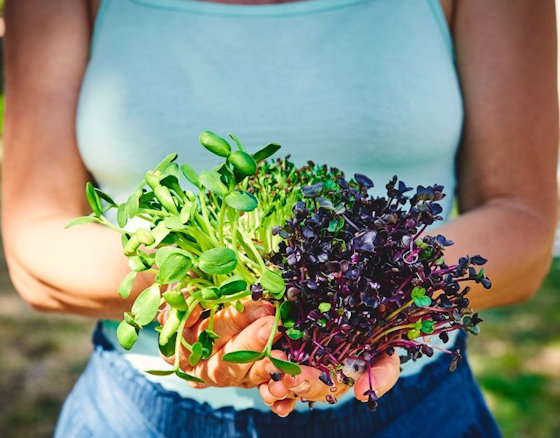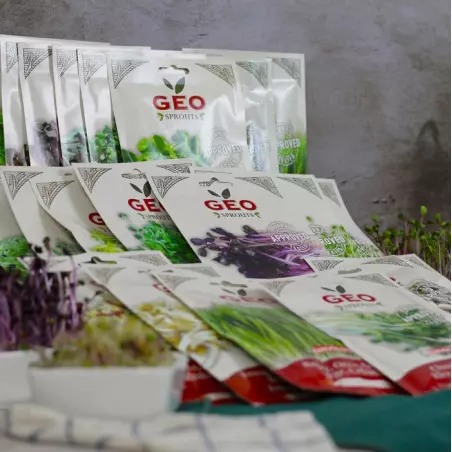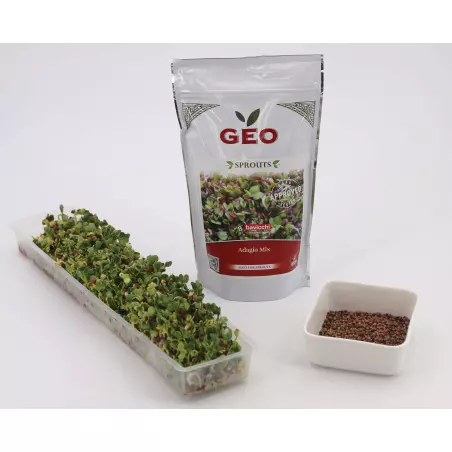Why eat sprouted seeds ?
Good digestibility
Easy and fun to produce, Generally known to the general public through Asian soybean sprouts, sprouted seeds are a superfood of first choice for good health. They contain minerals, antioxidants, enzymes, and other nutrients that help break down proteins, carbohydrates, and fats into smaller, more easily absorbable particles by the body. They are one of the pillars of a raw food diet.
Thanks to their high content of bioavailable nutrients, Sprouted seeds are one of the most nutritionally dense foods.. They provide vitamins, essential fatty acids, essential amino acids, and essential minerals in a form that is easier for the body to process and absorb than non-germinated seeds. Once soaked, they release phytic acid, an anti-nutrient enzyme inhibitor present in many grains and legumes, which has the drawback of preventing proper mineral absorption.
Furthermore, it has been shown that these small but powerful seeds improve digestion and promote weight loss due to their high fiber content. The enzymes present in sprouted seeds also help reduce inflammation of the intestinal lining while enhancing nutrient absorption.
Antioxidant capacity against free radicals
Sprouted seeds contain a high concentration of phytochemicals (antioxidants), which protect the body from damage caused by free radicals.
Here are some of these antioxidants:
Phenols and flavonoids These compounds are known for their antioxidant effects. Their concentration can increase during seed germination.
Glutathione : It is a major antioxidant produced by our cells. Certain sprouted seeds, such as broccoli, are known for their ability to increase glutathione levels in the body.
Sulforaphane : Particularly present in broccoli sprouts, it is a powerful antioxidant that has also demonstrated anticancer properties.
.jpg)
Bioavailable predigested nutrients
Sprouted seeds are an excellent source of pre-digested bioavailable nutrients. This means that the seeds have been broken down into smaller pieces by enzymes, which facilitates their absorption by the body. The high enzyme content of sprouted seeds helps improve digestion and promote weight loss.
Moreover, predigested nutrients present in sprouted seeds help reduce inflammation of the intestinal mucosa while promoting nutrient absorption. Germination also increases the vitamin content, as we will see later, while reducing carbohydrates, making them easier to digest and absorb. As for plant proteins, they are broken down into bioavailable amino acids.
The benefits of consuming sprouted seeds
Sprouted seeds are an excellent way to add nutrients to your diet without breaking the bank, in the form of fresh and living foods.
Although fresh sprouted seeds from the store can be expensive, they can be produced at home with minimal effort and equipment, quickly paying for themselves. The benefits of producing sprouted seeds at home are indeed numerous and varied.
- Local production
- Choice of organic quality seeds
- No transportation needed
- Unmatched freshness, incomparable to the pre-sprouted seeds available in stores.
- Optimal health safety
What are the nutritional benefits of sprouted seeds ?
Essential fatty acids
Essential fatty acids (EFAs) are fatty acids that the human body cannot synthesize on its own, and therefore they must be obtained through the diet. The two main essential fatty acids are linoleic acid (an omega-6 fatty acid) and alpha-linolenic acid (an omega-3 fatty acid), which are polyunsaturated fatty acids that the human body cannot produce.
Sprouted seeds, depending on their type, can be a good source of essential fatty acids. Here are some sprouted seeds that contain these essential fatty acids:
Sprouted flax seeds They are an excellent source of alpha-linolenic acid (omega-3).
Chia seeds Sprouted Like flax seeds, chia seeds are also rich in omega-3.
Hemp seeds Sprouted : These seeds contain a good balance of omega-6 and omega-3 fatty acids.
Sunflower seeds Sprouted : They primarily contain linoleic acid (omega-6).
Sprouted pumpkin seeds : They also provide omega-6.
Sprouted sesame seeds They are another source of omega-6.
Vitamins
Vitamin C Germination often increases the vitamin C content, especially in sprouted green or blonde lentils, as well as chickpeas.
Vitamin B complex It seems like your message is empty. Could you please provide the text you would like translated from French to English?
- B1 (Thiamine) : Present in the sprouted seeds of sunflower, flax, and wheat.
- B2 (Riboflavin) : Found in sprouted seeds of sunflower, sesame, lentils, alfalfa
- B3 (Niacin) : Contained particularly in sprouted buckwheat and sunflower seeds.
- B5 (Pantothenic acid) : Present in many sprouted seeds.
- B6 (Pyridoxine) : In the sprouted seeds of wheat, sunflower, and quinoa
- B9 (Folate or folic acid) : Very present in sprouted seeds of lentils, quinoa, and mung beans
Vitamin A (and carotenoids, precursors of vitamin A) The carotenoid content increases during germination, particularly in sprouted seeds of broccoli, alfalfa, and radish.
Vitamin E : This fat-soluble vitamin is found in many sprouted seeds, particularly in sprouted sunflower seeds, as well as in sprouted almonds.
Vitamin K Sprouted seeds of broccoli, alfalfa (lucerne), and fenugreek are good sources of vitamin K.
Phytonutrients
Sprouted seeds are incredibly rich sources of phytonutrients, which are natural compounds found in plants that offer health benefits. These compounds often contribute to the color, flavor, and disease resistance of plants.
When consumed, many of These phytonutrients have shown beneficial effects on human health.. Here are some phytonutrients commonly found in various sprouted seeds:
GlucosinolatesThese compounds are particularly present in the sprouted seeds of cruciferous vegetables, such as broccoli, cabbage, radish, and watercress. They can break down into isothiocyanates during chewing or digestion, compounds associated with cancer prevention.
SaponinsThey are found, among other things, in sprouted quinoa seeds andalfalfa (lucerne). They may have antioxidant and immunomodulatory properties.
FlavonoidsThese are powerful antioxidants found in many sprouted seeds, particularly alfalfa (lucerne) and sunflower sprouts.
Phytosterols: Present in many sprouted seeds, such as sunflower and sesame. They can help reduce blood cholesterol.
LignansFound in sprouted flax and sesame seeds, these compounds have antioxidant properties and may have protective effects against certain forms of cancer.
TriphenylmethaneA type of pigment found in sprouted watercress seeds and red cabbage.
The 3 different types of sprouted seeds: explanations
Non-mucilaginous sprouted seeds
Non-mucilaginous sprouted seeds refer to those that do not produce a gel-like or viscous substance when they are sprouted.
Among these seeds, you can find radish, broccoli, sesame, clover, alfalfa seeds, red cabbage, sunflower, radish seeds, chickpea, green lentil, brown lentil, mung bean, adzuki bean, leek, fennel, and fenugreek seeds to name just a few. The cultivation of these sprouted seeds is often easier and more straightforward than that of mucilaginous seeds.
Due to their lack of viscous substance, they do not require supports or specific germination techniques to ensure adequate aeration.
Simply rinse them regularly as soon as sprouts appear to prevent mold and promote healthy germination. In a few days (the germination period varies from 3 to 10 days depending on the seeds), under optimal humidity and temperature conditions, these seeds will germinate, providing a quick and abundant harvest of nutritious young shoots.
Mucilaginous sprouted seeds
Mucilaginous seeds are characterized by their ability to produce a gel-like or viscous substance when they are germinated. Among these special seeds are cress, certain mustards, flax, arugula, chia, basil, flax, and many others.
The presence of mucilage makes their germination process somewhat different from other seeds. To cultivate these seeds, It is generally not recommended to use the traditional method of a glass jar sprouter., because the mucilage will block the circulation of air and promote bacterial growth.
Instead, an effective method is to spread them out on a flat surface or to use an automatic sprouter with a small growth substrate. The third method involves mixtures of seeds with 85% non-mucilaginous seeds and 15% mucilaginous seeds.
Young shoots or green shoots
Young shoots represent a more advanced stage. in the plant growth cycle in relation to sprouted seeds. While a sprouted seed is the first stage of a seed's growth, as soon as it begins to develop small roots and the beginnings of a stem, green shoots are the result of an extended growth period of these sprouted seeds.
They are cultivated for a longer period., which allows them to develop stronger stems and tender leaves. This makes them not only delicious and crunchy to eat, but also rich in nutrients, vitamins, and minerals.
These small sprouts with a delicious taste are often used as garnishes or incorporated into salads, adding a touch of freshness and color to dishes with their beautiful green hue. In short, while the sprouted seed is the first sign of life of a plant, the young shoot is a more mature and developed expression of it.
Here are some examples of startups:
Young sunflower sprouts Sunflower sprouts are derived from unhulled sunflower seeds. They have a tender stem and dark green leaves. These sprouts have a mild, nutty flavor and are often used in salads or as a garnish. They are rich in vitamins and minerals, particularly vitamin E and zinc.
Young green pea shoots These sprouts come from the germination of the green pea seeds. They have a crunchy stem with tender green leaves. Their taste is mild, slightly reminiscent of fresh peas. They are often consumed in salads, green smoothies, or even lightly steamed. Young green pea shoots are an excellent source of vitamins C and A, as well as proteins.
Young shoots of unhulled buckwheat Buckwheat, when sprouted and grown to the young shoot stage, produces thin stems and light green leaves. These shoots have an earthy and slightly bitter taste. They can be used in salads, wraps, or as a garnish. Buckwheat is known to be a source of complete proteins, and its young shoots retain many of its nutritional benefits, including antioxidants and minerals.
Where can I find sprouting seeds ?
Organic product stores
To start producing sprouts, organic food stores are the ideal place to find sprouting seeds. These seeds are organic and free from pesticides and other chemicals, making them an excellent option for those looking to benefit from the nutritional advantages without the risks associated with chemicals.
You can also order them online from specialists like Biovie, which offers 25 types of seeds tested for their germination capabilities under 3 different packaging options.
Home germination kits
Home germination kits are becoming increasingly popular among people who want to make the most of their sprouted seeds and grow sprouts in their kitchen.
The kit makes it easy to learn how to properly germinate your own seeds.. The simplest kit is a simple jar with one or two tablespoons of seeds to sprout, which will allow you to grow small quantities to start with. You can then move on to a tray sprouter and, why not, the autonomous Easygreen sprouter, the Rolls-Royce of sprouters.
This method at home is not only practical and economical, but it also allows you to better control the process yourself and you can easily obtain a good quantity of seeds from dry seeds (some seeds increase their weight by 7 times, like alfalfa seeds) which will cost you much less than in the store and which you can harvest at the "freshest," in full germination, without refrigeration or transport.
Find our article to better choose your sprouter or germination kit.
What are the dangers of sprouted seeds ?
Very little risk
Sprouted seeds, when cultivated, handled, and stored properly and with common sense, present a very low risk of bacterial development. They are plant products that are much less sensitive than animal products.
Like any fresh food, they can be contaminated by pathogens, especially if they are exposed to polluted water or contaminated surfaces. However, By cultivating and consuming sprouted seeds quickly and maintaining good hygiene practices, these risks are minimized.
Sprouted seeds at home
Germinating seeds at home offers several advantages in terms of food security. First of all, it ensures complete traceability of the products consumed. By choosing seeds certified organic By controlling the germination process, the risk of exposure to pesticides, herbicides, or other contaminants is significantly reduced. Additionally, home germination limits the risks associated with long distribution and storage circuits, where sprouts can be exposed to cross-contamination or suboptimal conditions.
The freshness of home-grown sprouted seeds is also a guarantee of quality., because they are often consumed very shortly after being harvested, thus preserving their nutrients and preventing deterioration. It is enough to follow simple common-sense hygiene rules.
Finally, mastering the germination process at home ensures rigorous hygiene practices, reducing the risk of pathogenic bacteria development. You can add your seeds to your salads, preparations, vegetable juices, as herbs, and let them grow in their sprouter if you don't consume them all at once.
Commercially sprouted seeds
Sprouted seeds in trays sold in organic stores or supermarkets must undergo a series of logistical steps before reaching the consumer's plate. These steps include cultivation, packaging, storage, and then transportation.
Each phase of this chain can potentially expose the produce to temperature variations, cross-contamination, or other factors compromising their quality or promoting the growth of bacteria. The time elapsed between harvest and consumption can also increase the risks of pathogenic bacteria development, compared to home production.
Superfoods to incorporate into your daily routine
Sprouted seeds are truly nutritional treasures, providing a plethora of vitamins, minerals, antioxidants, and other essential nutrients in a bioavailable form. In addition to being a healthy supplement to any diet, they can be easily and inexpensively produced at home.
So, whether you are a vegetarian, vegan, health enthusiast, or someone simply looking to add more nutrients to your diet, sprouted seeds are an excellent choice. Embrace these little wonders of nature that deserve a spot on the health food podium and discover the numerous benefits that they can bring you on a daily basis.









